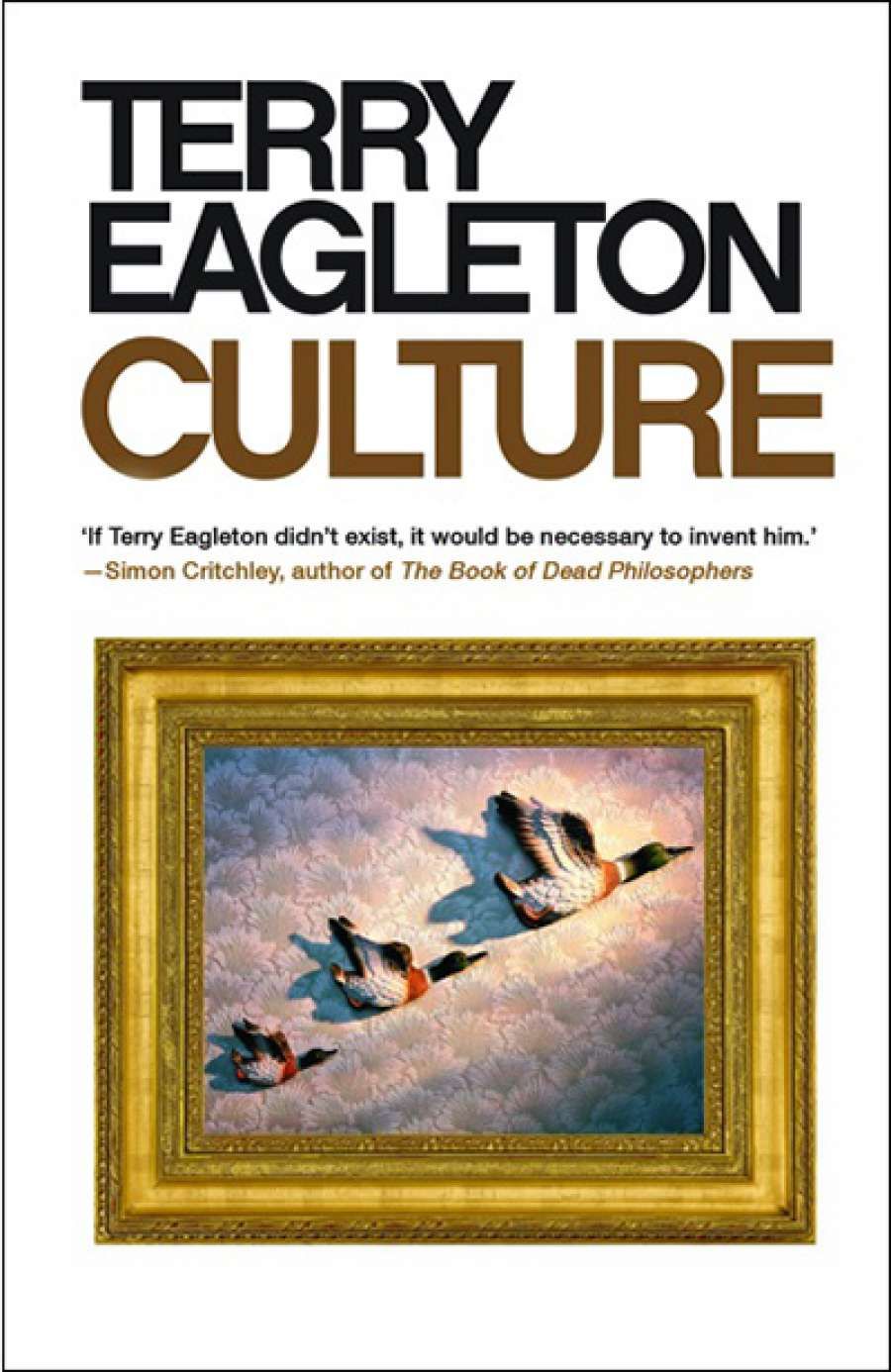
- Free Article: No
- Contents Category: Cultural Studies
- Custom Article Title: Andrew Fuhrmann reviews 'Culture' by Terry Eagleton
- Custom Highlight Text:
No one should be surprised that Terry Eagleton has written yet another book about the excesses of academic postmodernism. Railing against the pretensions and deceptions and ...
- Book 1 Title: Culture
- Book 1 Biblio: Yale University Press (Footprint) $38.95 hb, 192 pp, 9780300218794
This consciously old-fashioned but eminently reasonable position is developed by Eagleton in a lengthy chapter on Edmund Burke. 'No thinker,' writes Eagleton, 'has articulated the idea of culture as the social unconscious more magnificently than the eighteenth-century writer and politician Edmund Burke.' It is a clear highlight of the book, full of germane insights about the complex relationship between traditions, habits of life, and political power. The advantage of combining Burke's ideas with a residually psychoanalytical metaphor is not always apparent, but it does produce some lurid and spectacular results, particularly when Eagleton comes to discuss Burke's critique of the French Revolution:
In their metaphysical frenzy [the Jacobins] have inquired too deeply into things, stripping off the decorous vestments of culture, laying bare the shameful sources of social existence and turning their impious gaze on the father's phallus. Yet nobody can look upon this sublime authority without being struck blind; and in the case of the French revolutionaries, this blindness is the bedazzlement which comes from an excess of light.
And an excess of light, Eagleton reminds us, is a kind of madness against which culture and the deeper (sometimes unreasoned) impulses of the heart are a partial bulwark.
The bone Eagleton has to pick with contemporary Jacobins – the French postmodern theorists who dominate the cultural studies barnhouse – is not an excess of light or reason, but a lack of it. In particular, Eagleton is mightily pissed off about the sky-obscuring fog of identity politics, and the way this undermines any chance there might be for class solidarity, tra-la-la:
[S]ome sectors of the cultural left ... in their zeal for a discourse of difference, diversity, identity and marginality ceased to use the word 'capitalism', let alone 'exploitation' or 'revolution', some decades ago. Neo-liberal capitalism has no difficulty with terms like 'diversity' or 'inclusiveness', [whereas] it does with the language of class struggle.
Yes, all right, he has made this argument often enough, but can we be honest for just one illuminating moment? While it's true that neo-liberal capitalism has no difficulty with diversity and notions of the hybrid, it also has little difficulty with the diction of class strivings, at least not the affable roundabout formulations of which Terry Eagleton is master. Eagleton has written upwards of fifty books, all of them brimming with denunciations of neo-liberalism and globalisation and corporatisation. They sell very well, but not one of them has brought us an inch closer to the revolution. And not one of them was meant to.
 Terry Eagleton (Fronteiras do Pensamento, Flickr)
Terry Eagleton (Fronteiras do Pensamento, Flickr)
Culture has a laidback, free and easy, somewhat improvised quality, like the first draft of a more radical vision the author can scarcely contemplate with a level gaze. Meandering through a brief history of how culture and our framing of it have evolved, there are entertaining and informative sections on Oscar Wilde, T.S. Eliot, the German philosopher Johann Herder, and Jonathan Swift, and Burke is a constant and reassuring presence. But it all seems to come back to the scourge of postmodernism and to the same predictable litany of complaints that he detailed in The Illusions of Postmodernism in 1996. And it does seem that Eagleton prefers to remain ignorant of the way things are headed intellectually. He broods about whether the time has come to question the idea that all discourse is a form of inner speech. Really? Surely Terry Eagleton – who is, after all, first and last a professor of English – is aware that cultural theory nerds have been banging on about this for at least a decade.
Poor Canute didn't get very far whipping the waves; but, still, they must have eventually gone back. It's in their nature to do so. Rambling and genial, Terry Eagleton doesn't really have any expectation or appetite for change. And yet, the so-called cultural turn will eventually correct. Professor Eagleton will no doubt have his satisfactions as the conflation of culture and society is gradually unwound.


Comments powered by CComment